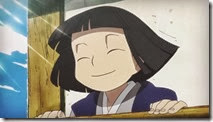 |
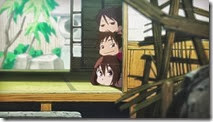 |
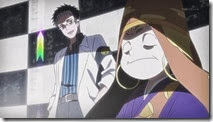 |
Kyousogiga continues to be the best new series of the fall, with no signs of slowing down.
In any given season there are always a few series that can fully engage me on an intellectual level, and a few that can do so on an emotional level. But the list of anime than can do both is always very, very short – there have been seasons where no shows at all could, and years where only one or two managed it. So far Kyousogiga is a powerhouse on both fronts, a wildly imaginative and intellectually dense thrill ride that massages the right and left hemispheres in equal parts. As I said last week ambition is in itself no guarantor of achievement, but if no shows ever tried to be as great as this one is trying to be anime would be a much sadder place.
As we dive deeper into Kyousogiga, I’m more and more convinced that it shares a good deal with the brilliant Kyoto series of this summer, Uchouten Kazoku. These are both surrealistic shows that love to chew on big ideas, but ultimately I think they’re both love stories – family love to be specific. While I’m somewhat familiar with the mythology and symbolism I haven’t read Through the Looking Glass (the sequel to Alice in Wonderland which Kyousogiga seemingly uses as a jumping-off point), so no doubt I miss some of the connections. But while the stylistic similarities with Lewis Carroll are unavoidable, the more I see of this story the more the connection I see is the one with Uchouten: the more outrageous it gets on the surface, the more obvious it becomes that the real story is about the universal human emotions of the core cast.
The series continues its strategy of putting together the story like adding tracks in a recording studio, one instrument at a time. The focus this week is on the eldest child of Inari and Lady Koto, Kurama, and his “cheerful and nerdy” subordinates led by Shouko (Chiwa Saitou) and Fushimi (Takemoto Eiji). I’ve loved all the segments that focused on the time of the three siblings’ childhood – they’ve been some of the most emotionally powerful in the series, and offered the most insight into the larger picture as well as the characters that drive the story. Kurama is the eldest, and in the present he’s the one in-charge – Yase at the very least and probably Myoue too seem to resent this a little, but not so much that they’re willing to push back hard. Why? Perhaps it’s that they realize he does, as he says, always try and do what’s best for all of them – but I think the larger reason is that they see the weight of the burdens he carries, and are happy enough to let him be the one to do so.
This is another parallel with Uchouten, where we saw the burden of expectations that an eldest sibling must bear, but this is an odd situation to say the least. Myoue – Yakushimaru as he was known as a boy – was clearly the first, though we don’t know yet if he’s the natural born son of Inari and Koto (indeed, if that’s even possible) or adopted. The others were made from Inari’s brush, presumably at least in part to keep Yakushimaru company, yet are immediately declared his older siblings. Yakushimaru is human and Yase definitively not, but while she seems to have little interest in the human world it’s different with the likewise not-human Kurama. While there are no signs he was ever less than kind and protective of his otouto, Kurama from childhood longed for the freedom Yakushimaru had – the freedom to come and go to the human capital of Kyoto. Kurama spends his time copying sutras and sculpting, and that doesn’t seem to change much after the family goes to Mirror Kyoto. Yase clearly prefers this new world but while Kurama is thrilled and grateful to his father for this place that was created, at least in part, for his benefit he understands that this is still not the “real” Kyoto that he longed so badly to see.
A big part of the success of Kurama’s character comes from Nakahara Shigeru’s brilliant performance, which perfectly captures a soul of bottomless depths swimming with notions incomprehensible to the rest of the world. It also captures the hurt beneath the endlessly projected patience and strength, the hurt at being abandoned and forever denied the world that his brother had the chance to experience. Kurama is both the observer and the analytic in the cast, and has been from his artificially created boyhood – though if you hoped to gain any clues from his “History of the Takayamadera Family” (is that the first time we’ve heard them referred to as such?) the strategically placed “Stuff Happened” entries put the kibosh on that notion. Kurama wants very badly to see that Kyoto he was denied, and while I have no doubt his love for his family is genuine that burning desire makes his character perhaps the most enigmatic and dangerous in the cast.
As for Shouko and Fushimi, while it’s the former that makes the big noise it’s the latter that seems like the crucial figure in the story. As much as I love Saitou-san I’m not as crazy for Shouko as the rest of the cast – she seems the most like a traditional anime character, and seems to operate mostly on the comic relief level (albeit effectively) where the others swim in deeper waters. But while Fushimi plays the put-upon assistant well, he’s got the interesting story – apparently a defector from Shrine, he reports directly to Kurama. If one were conspiracy-minded, one might speculate that the real power figures in this story share names with the great Shrines and Temples of Kyoto – Inari, Yase, Kurama et al – and it’s interesting that it’s Fushimi and Inari whose names are linked by the legendary Shrine in South Kyoto (an Inari Shrine in the village of Fushimi) which bears their names.
The story continues to expand the ONA canon next week as it turns to Yase, but as the contents of the other two ONA episodes seem largely to have been addressed by the TV episodes, we may move into completely new territory after that. A big part of the story is no doubt going to be watching how all the puzzle pieces that have been shaken out onto the table so far fit together – Kurama estimates that it’s 80% likely that Koto is related to Inari, and while the exact nature of that relationship remains a mystery I’m pretty confident that it exists. There’s a strong sense (which is stronger with original anime than with adapted in general) that Kyousogiga is a complete story that’s been very exactingly constructed, where nothing is left to chance and everything we see is there for a reason. We have indeed fallen through the looking glass and become part of the fascinating world on the other side, and it’s the sort of journey that anime is uniquely suited to guide us on – if only it would aspire to do so more often.
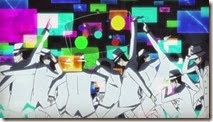 |
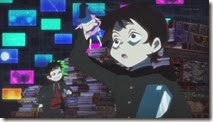 |
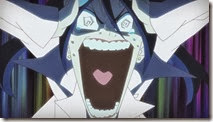 |
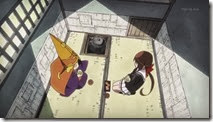 |
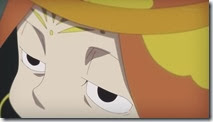 |
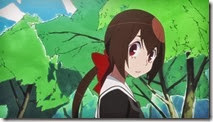 |
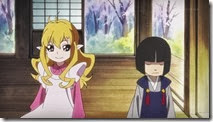 |
 |
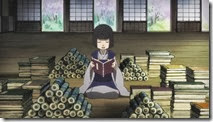 |
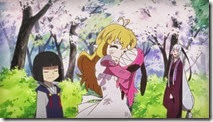 |
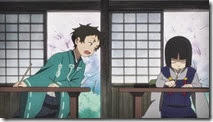 |
 |
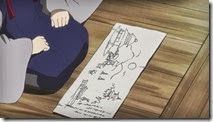 |
 |
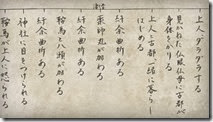 |
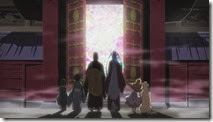 |
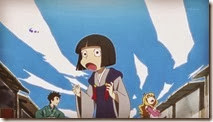 |
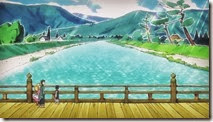 |
 |
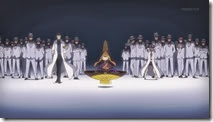 |
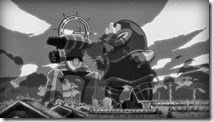 |
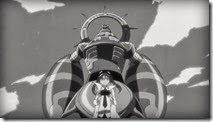 |
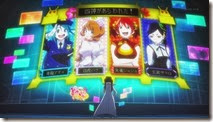 |
 |
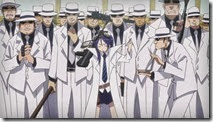 |
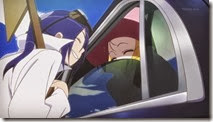 |
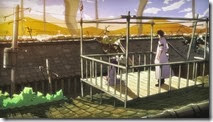 |
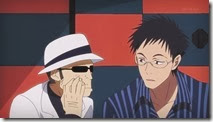 |
 |
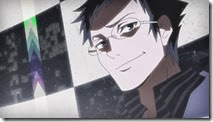 |
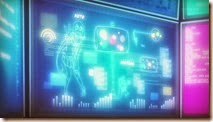 |
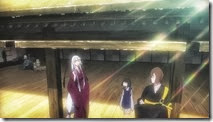 |
 |


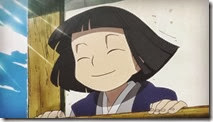
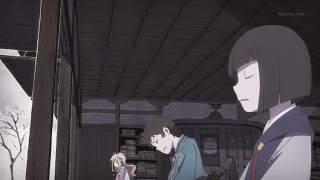
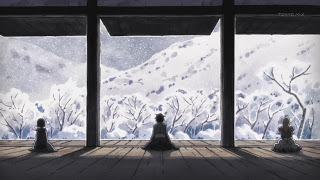
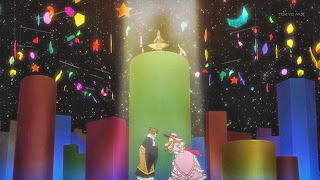
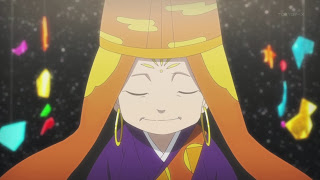
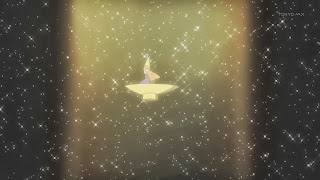
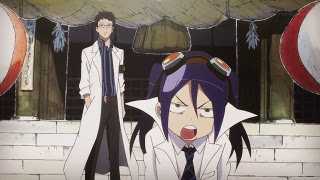
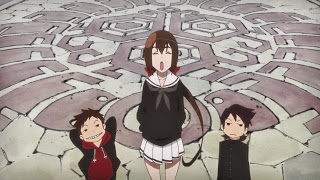
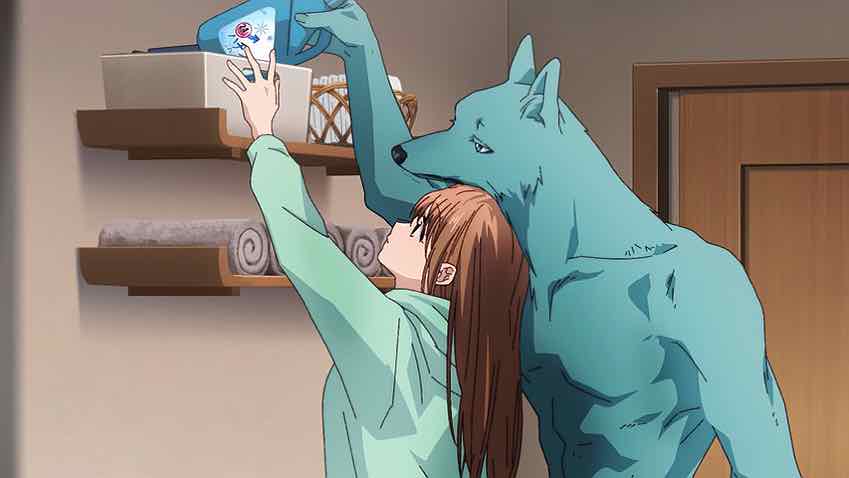
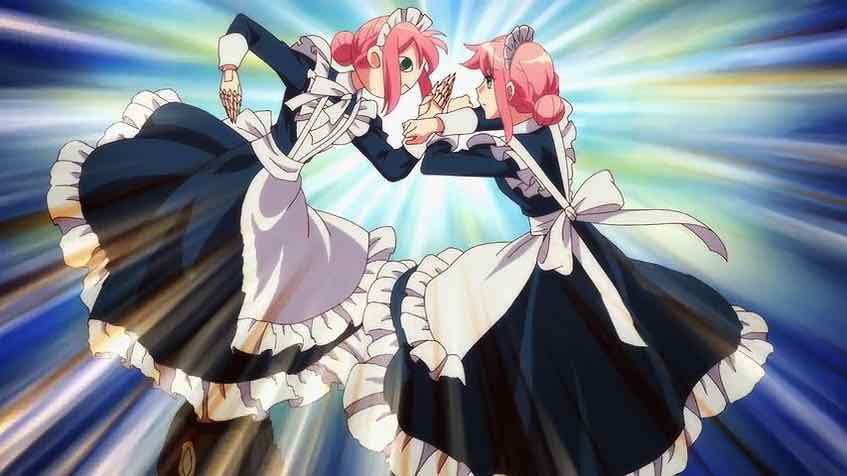
sonicsenryaku
October 24, 2013 at 1:07 pmThis series hasnt quite got me in the way it's gotten you enzo, but i will say that as of right now, this is a fairly competent series, brimming with some imaginative ideas and flooding at the seams with potential to be an emotional and stimulating experience on the senses. The best way i can describe my experience with this series is that while it remains an interesting watch, what with its tantalizing setting which at times feels like a lucid dream, it has yet to evoke that emotional impact for me and i am still waiting for that moment. As of right now i can see that the three siblings have certain individual issues they are all tackling:
Kurama's desires to see the outside world; and perhaps he feels more hurt at the disappearance of his mother and father because he had this dream of his family taking him out of the mirror capital to see the rest of the world, just for it to slip from his fingers which would probably explain why he didnt cry when his parents disappeared because his heart was more filled with frustration than with sadness. It was almost like he felt that they selfishly broke a promise with him. He earns to feel important outside of this mirror world because in this world, he feels like his accomplishments are inconsequencial, especially since its almost like an afterlife. (he's only a drawing and yet is the one out of the three siblings who mostly desires human purpose; maybe it's because he's a drawing)
I think the one most fragile right now is Yase; as we can see from her childhood, she has a veritable range of emotions and she can flip in and out of them on a dime. She also has this possessive attachment to the things she loves and so with the disappearance of her family (which probably devastated her fragile psyche more than the others), she yearns to have the comfort of company, more akin to that of "the perfect family" who will never abandon her and leave. She also seems to desire control and probably indulges in this as well as her yearning for her family through her stuffed animal toys.
As for Yakushimaru, as the only human of his siblings, its a surprise that he has camouflaged in this other worlds so well. Still, he is burdened with his status as monk, more or less because of the constant reminder it gives him of his father, but at the same time, he finds solace in his position in the hope that it may lead him closer to the truth as to the whereabouts of his family, and now he has a lead in koto, who im pretty sure is an alternate version of the black rabbit while her sensei is an alternate myoe (parallel universes and all that jazz).
The characters do have their different spectrums and as the series goes i really want to see them blossom with emotional depth. The writing so far is above average and im hoping that the subtle progression transmutes its characters and this series as a whole into a captivating canvas of vibrant, scintillating, and evocative art (my expectations are higher and im more critical when a show tries to be as ambitious as kyousigaga). On a side note, the girl yakushimaru proposed to as a child, she never grew up right??? or was it that she did but she didnt become as developed as she would have liked to be. In the mirror capital, the citizens dont age right?
Dick McGuy
October 24, 2013 at 1:09 pmShe never grew up. And then Myoue hit it off with another girl when he grew up.
Not exactly the purest monk.
sonicsenryaku
October 24, 2013 at 4:58 pmDamn, that kinda sucks really. You can tell that his childhood friend (i guess she could be classified as that) is bumped out about it and when she brings it up, he gets bumped about it as well. I agree; not exactly the purest monk indeed, especially since supposedly he's a womanizer, but regardless id like to see more of his childhood friend. I thought that was quite the interesting dynamic with him trying to still keep his connection with her even though he is all grown up (though technically, she has lived just as long as he has)
ishruns
October 25, 2013 at 12:42 amThe more I watch Kyousogiga and also reminisce about Uchouten Kazoku, the more I think there's something messed up with anime right now. But for the first time in my fandom I think there's something messed up the right way.
Since when did two shows of this much intelligence, creativity, emotional punch and sheer novelty air back to back. There have been some truly spectacular animes over the past few years make no mistake but these two are taking the game to the next level I feel, taking FLCL's formula to the next level and that is absurd in the financial constraints and tastes of today's market. I simply cannot fathom why the producers would go out of their way to make something so amazing that will be ignored by at least 90% of anime fans. It's like making the greatest gun in the world and shooting your own foot with it. Why do they do it and please continue doing so.
admin
October 25, 2013 at 5:54 amThe stalker evidence is that Kyousogiga may not in face be a complete disaster commercially, more of a middling one (2-5K combined) but it's way too early to tell.
As for why shows like this get made, I think it's something akin to why publishers occasionally release scholarly books and critical favorites and not just beach readers – in the biz they're called "prestige titles". They do it to try and boost their overall brand as a beacon of quality while 95% of what they release is pulp.
Luxorcism
October 25, 2013 at 7:17 pmThe same thing happened with SSY, to be honest. And Toei has everything to gain from this, since they usually release series with usually-shitty animation like the One Piece anime (though Precure is an exception, I've seen clips of some damn fine animation). If Toei's looking to up its rep with some of the most artistic and poetic stuff this season, it's a thumbs up from me.
Ronbb
October 25, 2013 at 4:34 amA great write-up again, Enzo, and Kyousogiga does remind me of Uchouten in many ways. There are many things to praise about. The show has been very well directed — almost every frame has a meaning — and very well written — almost every line of the script adds something to the characters and the story. Kyousogiga is playing a totally different ball game, and it's my favourite show this season.
The best part of show for me is how it can breathe so much life into the characters and surface so much emotion. Sometimes it's just a line or so, and sometimes it's just a little gesture — like how Kurama's little hand reaching out to his father's back this week. Kurama also seldom opens his eyes, but when he does, he's really saying something from his heart and no longer the restrained and dutiful elder brother.
I quite like the narrative of the show. It doesn't flow from a straight line — and is quite reflective of the multi-universe setting — but I don't find myself lost at all. While it's 100% original, it feels like reading a novel at times. By the way, I'm starting to like the OP. It's still a little Jpop-ish, but I like the lyrics — it's befitting the show.
All in all, Kyousogiga is very meticulously planned, and it's very heartfelt. Like Uchouten, I'm glad that it gets aired.
thedarktower
October 25, 2013 at 7:24 amit does remind uchouten kazoku, but still, there is a gap between the two.
I think both of them try to reflect something upon us in a very unique way.
however in kyousogiga they are kinda hurry up with exposing us to the main event, while in uchouten it took time not only to establish eveyrthing, but also the first half was more or less "everyday life". it's not only difference and I can say a lot more about differences and similarities, but I won't compare them. I enjoy kyousgiga in its very own way. it's indedd probably the craziest and wildest show today, in a postivie way of course.
a friend of mine told his feelings about Kyougogiga after watching eps 00-01: "I've never tried to take drugs or something, but I bet this show is like doing so (in the anime manner)".maybe it sounds bizarre, but think about it, we've said so ourselves – we need to experience the show, not watching, simply straight our back and feel the fun.
sonicsenryaku
October 25, 2013 at 8:00 amagreed; my only slight problem with kyousogiga that holds me back from calling it an intellectual work is the way it which it tells its narrative. In my opinion, its too systematic, unlike uchouten which was more natural in the way it wen t about introducing characters and immersing its audience within their drama. Kyousogiga's narrative has this feeling of telling presenting it's character and plot points in segments; and while that's okay, a more seemless, interconnecting narrative would arguably make the story stronger (though i must admit a part of my opinion on that is due to personal taste). The segmented narrative doesnt give me enough time to fully bond with the characters. I really would like to see these characters have much stronger interactions and i would also like for the series to continue yakushimaru's interaction with that childhood friend of his. The idea of outgrowing your friends and family while they never age is an interesting topic to me.
As of now, the above average writing is definitely carrying the show and im pretty glad that it's here and that it exists. Here's to more engrossing anime and to more anime for young adult/adult minds in general.